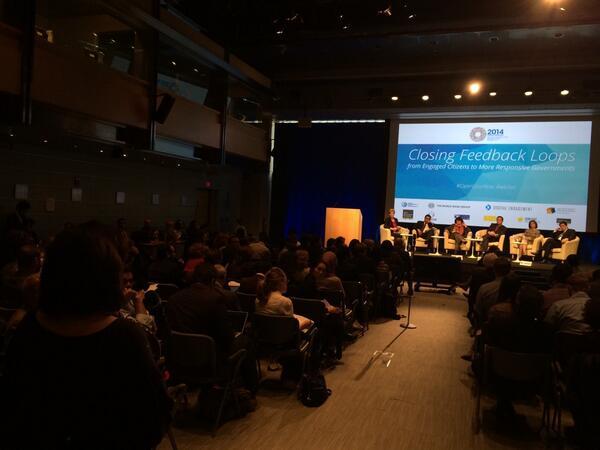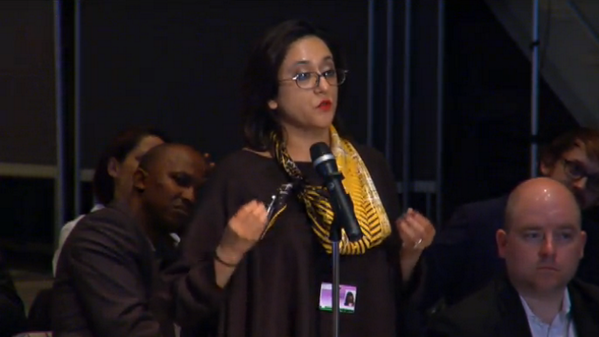Feedback initiatives seek to amplify citizen voices in shaping development priorities, monitoring progress and evaluating results. How does this intersect with other elements of democracy, such as parliamentarians elected to represent their constituencies?
Earlier this week, the World Bank hosted an event on "Closing Feedback Loops: From Engaged Citizens to More Responsive Governments.” Government, multilateral and civil society representatives discussed the opportunities and challenges of sparking meaningful dialogue with citizens related to development investments and results. Much of the event focused on familiar themes: engaging citizens is not just a means to better development projects, but is an end in itself; technology is a catalyst, but not a panacea to more inclusive dialogue; addressing incentives to participate is critical to sustainability; and governments and donors must be committed to respond and act upon feedback. One discussion thread worth highlighting is that of the relationship between citizen feedback and representative democracy. Several participants, including a former parliamentarian, raised questions as to whether citizen feedback efforts adequately take into account parliaments and if these initiatives may even circumvent the legitimacy of elected representatives.

Courtesy Image: Alex Howard
I'd frame the issue for consideration somewhat differently, as a question of whether feedback initiatives circumvent elected representatives or revitalize democratic dialogue. One's answer to this question depends on how you define democracy. Does the role of citizens begin or end at the ballot box? Do citizens cede their voice to their representatives to advocate on their behalf in policy discussions or does vibrant democracy demand that citizens must also participate in informed dialogue?
Elected representatives can play a critical role in promoting more accountable development policies and effective investments. They are just as in need of real-time information from their constituents as are line ministry officials in the executive branch or international donor agencies. Governments and donors setting up systems to solicit feedback from citizens on development investments, projects and governance have an obligation to ensure that this information is also accessible to legislatures.

Courtesy Image: Open Government Partnership
Parliamentarians are certainly in a much stronger position to shine a light on how well governments and donors are doing in responding and acting upon citizen concerns. If elected officials have access to the same information that their counterparts in line ministries and donor agencies do, they can help incentivize officials in the executive branch and donor agencies receiving the feedback to do something about it. In the words of one participant, Norma Garza, parliamentarians might just enable countries to actually close the feedback loop. Admittedly, this has been an oversight in much of the dialogue surrounding citizen feedback initiatives to date where engaging parliaments has taken a backseat in discussions focused on collapsing the distance between executive branches, donors and communities.
Failure to take parliamentarians into account when soliciting citizen views on investment priorities and development results could have harmful consequences. Without real-time information, elected representatives are more likely to make decisions with limited situational awareness of the concerns of their constituents. The effectiveness and sustainability of the citizen feedback initiatives themselves could be undermined without involvement, and buy-in, from legislatures.
Does the assumption that parliaments are willing to be responsive to citizen feedback hold true in practice? Elected representatives may face the same incentive problems as those in the executive branch and in donor agencies, namely, the cost, time and effort involved in acting upon concerns that citizens raise. As another participant, Richard Pietro argued, integrating citizen feedback into the decision-making calculus of elected representatives may require them to reconceptualize their role as ”facilitators of good governance.”
Open data and citizen feedback will not improve accountability on their own. There are countless new feedback initiatives, but less is known about what incentivizes people to incorporate this information into their decision-making processes and, ultimately, change their behavior. Despite these unknowns, open data and citizen feedback are two necessary components if we want to see citizens, governments and donors engaged in a productive dialogue about what and where to invest in a country's development.
Citizen feedback and open data are best viewed as part of a broader movement towards societies that embrace inclusive and democratic dialogue. This implies that feedback initiatives shouldn't be viewed from a narrow technocratic lens. Instead, feedback should be better integrated within existing efforts to promote good governance. Donors already invest in activities to strengthen legislatures, bolster civil society and equip line ministries. Civil society groups have been involved in grassroots mobilization efforts with local communities and advocacy efforts with governments for greater transparency. A growing number of governments are signing on to open government and open data initiatives in an effort to combat information stovepipes, professionalize their civil service and become more transparent with their citizens.
In order to close the loop, we need to not only help citizens provide feedback, but also support governments in responding and acting upon it. We will get further if this is part of a concerted effort to create a supporting ecosystem for robust citizen-state dialogue rather than simply a stand-alone focus on feedback platforms.

